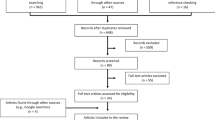Abstract
A national policy of reindustrialization has been undertaken to rejuvenate the nation's industrial base. These policies, if effective, will accelerate the economic decline of communities vulnerable by fact of geographic location or dependence upon a marginal plant in a receding industry. The community economic crisis that results from a loss of a major employer will produce increase in a range of mental and behavioral disorders. At the same time, mental health agencies will experience a declining resource base with which to respond to the increased demand for services. Mental health administrators must choose between adopting intervention approaches that have been long resisted or admit their inability to meet the challenge. Direct service approaches will be too costly and ineffective.
Similar content being viewed by others
References
Aiken, M., Ferman, L., and Faber, S.Economic failure, alienation, and extremism. Ann Arbor: University of Michigan Press, 1968.
Barling, P. and Handel, P. Incidence of utilization of public mental health facilities as a function of short term economic decline.American Journal of Community Psychology, 8:31–45, 1980.
Breed, W. Occupational mobility and suicide among white males.American Sociological Review, 28:179–188, 1963.
Catalano, R. and Dooley, D. Economic, life and disorder changes: Time series analysis.American Journal of Community Psychology, 7:381–396, 1977a.
Catalano, R. and Dooley, D. Economic predictors of depressed mood and stressful life events in a metropolitan community.Journal of Health and Social Behavior, 18:292–307, 1977b.
Cohn, R. The effect of employment status change on self-attitudes.Social Psychology, 41:81–93, 1978.
Cowan, E. Help is where you find it: Four informal helping groups.American Psychologist, 8:385–395, 1980.
D'Augelli, A. and Vallance, T. The helping community: Issues in the evaluation of a preventive intervention to promote informal helping.Journal of Community Psychology, 10:199–209, 1982.
Dooley, D. and Catalano R. Economic change as a cause of behavioral disorder.Psychological Bulletin, 87(3), 450–468, 1980.
Foltman, F.White and blue in a mill shutdown. Ithaca: Cornell University Press, 1968.
Hirsch, B. Natural support systems and coping with major life changes.American Journal of Community Psychology, 8:159–172, 1980.
Iscoe, I. Community psychology and the competent community.American Psychologist, 29:179–188, 1974.
Kasl, S., Gore, S. and Cobb, S. The experience of losing a job: Reported change in health, symptoms, illness behavior.Psychosomatic Medicine, 37:106–122, 1975.
Kelly, J. Community psychology: Some priorities for the immediate future.Journal of Community Psychology, 3:205–209, 1975.
Lendrum, S. A thousand cases of attempted suicide.American Journal of Psychiatry, 13:479–500, 1933.
Marshal, J. and Funch, D. Mental illness and the economy: A critique and partial replication.Journal of Health and Social Behavior, 20:282–289, 1979.
Mick, S. Social and personal costs of plant shutdowns.Industrial Relations, 203–208, 1975.
Murrell, S.Community psychology and social systems: A conceptual framework and intervention guide. New York: Behavioral, 1973
Oliver, J. and Pomicter, C. Depression in automotive assembly line workers as a function of unemployment.American Journal of Community Psychology, 9 (5):507–512, 1981
Parnes, H. and King, R. Middle-aged job losers.Industrial Gerontology, 4:77–95, 1977.
Porter, R., Peters, J. and Heady, H. Using community development for prevention in Appalachia.Social Work, 18:302–307, 1982.
Sainsbury, P.Suicide in London: An ecological study. New York: Basic Books, 1956.
Sarason, S.The psychological sense of community: Prospects for a community psychology. San Francisco: Jossey-Bass, 1976.
Sheppard, H., Ferman, L., and Faber, S.Two old to work—too young to retire: A case study of a permanent plant shutdown. Washington, D.C.: U.S. Government Printing Office, 1960.
Slote, A.Termination: The closing at Baker plant. Indianapolis: Bobbs-Merrill, 1969.
Stevens, J.The Oregon wood products labor force: Job rationing and worker adaptations in a declining industry. Special Report 529 (Corvallis: Oregon State University Agricultural Experiment Station, 1978).
Theorell, T., Lind, E., and Floderus, B. The relationship of disturbing life-changes to the early development of myocardial infarctions and other serious illnesses.International Journal of Epidemiology, 4:281–293, 1975.
Thurow, L.The zero-sum society. New York: Basic Books, 1980.
Tuckman, J. and Lavell, M. Study of suicide in Philadelphia.Public Health Reports, 73:547–553, 1958.
Tuckman, J. and Lavell, M. Study of suicide in Philadelphia.Public Health Reports, 73:547–553, 1958.
Waters, F. Bartering: Cooperative helping system for families.Journal of Community Psychology, 10:62–65, 1982.
Weeks, E. Plant modernization and community economic stability. Unpublished paper, University of Oregon, July 10, 1982a.
Weeks, E. Reindustrialization and community economic crisis. Unpublished paper, University of Oregon, March 26, 1982b.
Weeks, E. and Drengacz, S. The non-economic impacts of community economic decline.Journal of Health and Human Resources Administration, 4 (3):303, 1982a.
Weeks, E. and Drengacz, S. Rocking in a small boat: The consequences of economic change in rural communities.International Journal of Mental Health, in press, 1982b.
Additional information
Edward C. Weeks and Sandra R. Drengacz are both affiliated with the Dept. of Planning, Public Policy and Management, Hendricks Hall, University of Oregon, Eugene, OR 97403. Requests for reprints should be addressed to the first author at that address.
Rights and permissions
About this article
Cite this article
Weeks, E.C., Drengacz, S.R. Reindustrialization and mental health. Administration in Mental Health 10, 225–238 (1983). https://doi.org/10.1007/BF00823102
Issue Date:
DOI: https://doi.org/10.1007/BF00823102




